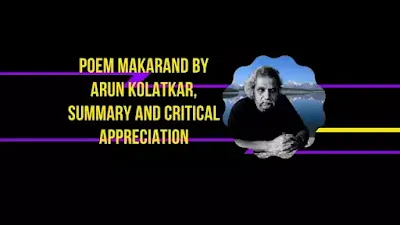Summary of the Poem:
The attitude of the protagonist (whose name is Manohar) towards the pilgrimage, which Maharashtrians and the others make to Jejuri in order to worship the stone image of Khandoba , is one of scepticism and even disbelief, although some critics take the view that Kolatkar does not entirely dismiss this pilgrimage as meaningless. Anyhow, the speaker in this poem does go to Jejuri but he refuses to enter the temple in order to offer worship. When asked to take off his shirt and enter the temple to do the puja (or worship), he simply refuses to do so. However, he does not object to his companion's going inside and offering worship to the stone image of Khandoba. As the speaker (or the protagonist) would have to spend half an hour or so all alone (when his companion or his guide, or whoever may be the other man, would be busy inside the temple, performing the puja, he (the protagonist) demands the matchbox from that companion, saying that he would spend his time smoking in the courtyard where nobody would object to his smoking.

Critical Appreciation of the Poem:
In this poem the protagonist (whose name is Manohar) frankly refuses to join the worship which the pilgrims have come to offer to the image of god Khandoba. Here the protagonist's (or the poet’s) scepticism turns into total disbelief. In fact, he prefers smoking to going into the temple for purposes of worship. In other words, the speaker or the persona in the poem objects to the very act of the worship of a stone or bronze image supposed to represent a deity.
In this connection the comments of a critic are not only pertinent but illuminating. He says that for the first time the pilgrim (or the protagonist) is faced with the problem of worshipping a god in the poem Makarand. The pilgrim would rather smoke outside than go inside shirtless for the worship. His objection is not merely to his taking off his shirt but to the worship itself. There is a tone of impatience at the very idea:
Not me.
But you go right ahead
if that's what you want to do.
Give me the matchbox
before you go,
will you?
His irritation is revealed by the tone of “Not me” and “will you?” The title of the poem needs a word of explanation. “Makarand” means to all those, who know Sanskrit, “honey”, but here it is used as the name of a certain sweet offering to a god , somewhat like “modak”.
This critic then goes on to say that Makarand puzzles the reader who has all along followed the protagonist's complaint that there is no god - worship at Jejuri. Here, where there is worship , the protagonist does not wish to be a party to it on the ground that he is being asked to observe a meaningless form . His refusal is not merely because of the required form but because he sees no meaning in the form of worship itself. This impression is strengthened by reading another poem which is entitled The Temple Rat and which is a humorous poem.






